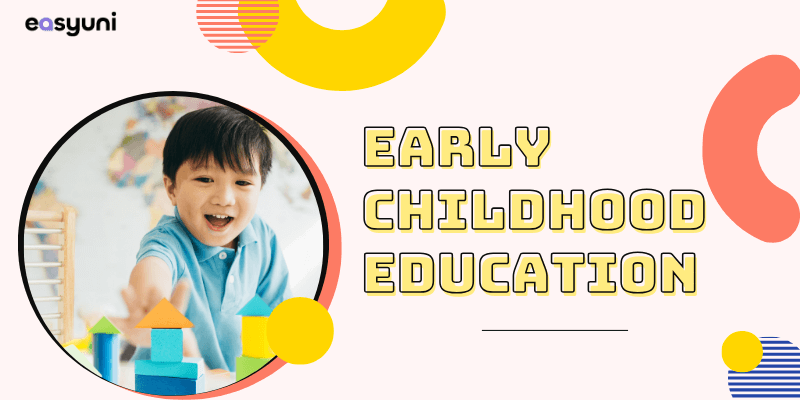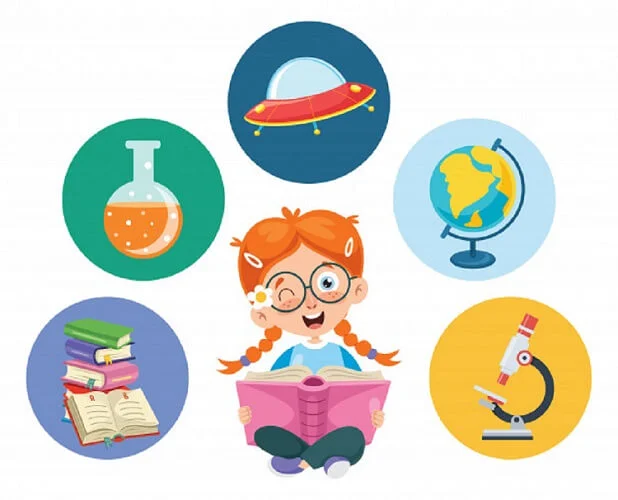
Do you enjoy spending time with children? Or do you aspire to work in a vibrant and cheerful environment with kids?
If both of these resonate with you, you might have a talent for pursuing a career in early childhood education (ECE).
When people think of ECE, they often imagine working with and managing the playful behavior of kindergarten children. However, studying ECE, particularly at the diploma level, provides you with the basic education to become a professional in the field. You will gain the knowledge, skills, and attitudes necessary to excel as an early childhood educator.
So, what exactly will you learn in an ECE diploma program? What career opportunities are available in the ECE industry in Malaysia? To learn more about this course in Malaysia, let's explore this guide!
What are early childhood education studies all about?

One common misconception among those unfamiliar with early childhood education (ECE) is the belief that ECE educators only work in kindergartens. While many do work in kindergartens, this does not mean their expertise is limited to that setting.
In fact, early childhood education is a comprehensive program offered at colleges and universities in Malaysia, focusing on infants, toddlers, and young children. If you choose to study ECE, you will learn about child development, pedagogy approaches, health and safety, and management skills.
This program is crucial because, as an educator, you need to understand that the early years of a child's life are vital for cognitive development and the acquisition of motor, social, and emotional skills.
Therefore, if you are interested in pursuing a career in ECE, keep in mind that this field is very demanding. You will need to educate young children while prioritizing their motor, social, and emotional development.
What are the important aspects you need to know about early childhood education?
Understanding the important aspects of ECE can help educators, parents, and caretakers provide the best possible start for young children. Here are some key aspects to consider:
1. Child psychology
As you pursue your studies in early childhood education, you will explore child psychology, a crucial aspect. This field offers valuable insights into children's growth, learning processes, and interactions with their environment.
You'll learn the developmental stages from infancy to early childhood, grasping the key milestones in physical, cognitive, social, and emotional growth. Moreover, understanding child psychology empowers you as an educator to adapt your teaching methods to suit the individual needs of each child.
2. Educational development
When you work in this field, you need to provide a secure, nurturing, and stimulating learning environment for children.
This environment should promote exploration and play, vital for encouraging their interaction with objects and surroundings from an early age. These experiences help them learn and respond to different situations.
So, how can you ensure an engaging learning environment?
You need to ensure that settings like classrooms are designed to accommodate various activities. These activities may include playing with peers, interacting with items correctly, and providing a quiet reading area.
With this approach, you can spark creativity and curiosity in children, encouraging them to explore and respond to new experiences.
3. Play-based learning
The way young children learn about objects and their surroundings is inherently different from that of adults. Toddlers and children primarily rely on their senses, such as touch, to understand things. Hence, one effective approach to teaching this group is through play-based learning methods.
Play is a primary mode of learning for toddlers. Through play, children's natural curiosity is heightened, encouraging them to explore their environment. Additionally, it also helps them to develop social skills, as they interact with peers of similar ages.
4. Parental involvement
Active family involvement in a child’s education can significantly enhance learning outcomes.
ECE programs should encourage parents and caregivers to participate in their child's education through regular communication, volunteering, and providing learning activities at home.
A practical way to ensure that family-child interactions happen at home is by scheduling regular meetings with parents.
These meetings not only help in understanding the child's interactions with family members at home but also enable you, as their educator, an assessment of the child's developmental progress within their home environment.
Does the child demonstrate appropriate ways of handling objects at home? How do they interact with their siblings? Are they capable of taking turns or sharing toys?
These aspects of child development require attention when involving family members. If there is a lack of family interaction, you can provide suggestions to parents based on your observations of the child.
5. Observation, assessment and evaluation
As an ECE educator, you need to regularly assess and evaluate children's progress. This allows you to pinpoint areas where they might need extra help. These assessments should be tailored to their developmental stage and used to guide teaching rather than just measure performance.
To stay informed about the children's progress, you can rely on observations, portfolios, and activities led by the children themselves, as these offer valuable insights into their development.
What are the entry requirements for this course in Malaysia?
Here are the entry requirements for those of you who are interested in pursuing a Diploma in Early Childhood Education in Malaysia:
- SPM/ O-Level: Pass at least in 3 subjects
- UEC: Pass with a minimum of 3Bs, including in English
- Other equivalent qualifications as recognized by the Government of Malaysia
How long does it take to complete a Diploma in Early Childhood Education in Malaysia?
The duration of the course varies depending on the college or university, but generally, it involves 3 years of study.
What subjects will you learn in this program?
The subjects you will cover in the Diploma in Early Childhood Education may differ depending on the institution. For instance, here are core subjects that you will need to take for this course at SEGi College Kuala Lumpur:
Year 1
- Understanding the Child’s Growth & Development
- Effective Learning Spaces for Young Children
- Play & Learning for Young Children
- Physical Education & Health Care for Young Children
- Academic English
- Inclusion in Early Childhood
- Observation & Assessment in Early Childhood
- Curriculum Planning & Development for Young Children
- Creativity for Young Children
- Applied Digital Skills
- Safety & Well-being for Young Children
- Global Citizenship for Young Children
Year 2
- Classroom and Behaviour Management
- Language & Literacy for Young Children
- Mathematics for Young Children
- Science & Technology for Young Children
- Spiritual & Moral Values for Young Children
- Practicum 1
- An Introduction to Montessori Pedagogy (Elective)
- Industrial Revolution 4.0 in Malaysia (NEW)
- Programme Planning and Development in Early Childhood
- Administration and Management in Early Childhood
- Partnering with Families and Community
Year 3
- Professionalism in Early Childhood
- Co-curriculum management
- Practicum 2
Where can you study this course in Malaysia?
In Malaysia, there are various institutions that provide diplomas in early childhood education. such as:
3. UNITAR International University
5. Management and Science University (MSU)
6. Universiti Tun Abdul Razak (UNIRAZAK)
7. Tunku Abdul Rahman University of Management and Technology (TAR UMT)
Universities in Malaysia with courses in Early Childhood Edu
-

Malaysia
-

SEGi University
FeaturedSelangor, Malaysia
-

University of Cyberjaya (UoC)
FeaturedMalaysia
-

Kuala Lumpur, Malaysia
-

WP Kuala Lumpur, Malaysia
-

Malaysia
-

Malaysia
-

Malaysia
-

Selangor, Malaysia
-

Malaysia
See more related universities
Who should pursue a Diploma in Early Childhood Education?
If you're wondering whether this course is the best fit for you, it's essential to evaluate your own qualities. This is because pursuing a Diploma in Early Childhood Education is ideal for individuals with a profound love and passion for working with young children.
Here's a breakdown of who might find this diploma beneficial:
1. Genuine affection for children
If you genuinely care about children and aspire to positively influence their lives, exploring further into the study of ECE may be the right choice for you.
You possess qualities such as patience, empathy, and effective communication skills, which are important for effectively engaging with young learners and grasping fundamental teaching concepts when instructing them.
You also have a deep interest in child development and are keen to explore various teaching methods tailored to early childhood education.
For you, working with young children isn't merely a profession but a calling, and you're committed to continually enhancing your abilities and knowledge to better serve the needs of your students.
2. Develop young minds
Apart from genuinely caring for children, it's also important for you to feel responsible for creating a supportive environment where they can learn and thrive.
When you start working in this field, your role goes beyond teaching; you're there to guide them, spark their curiosity, and foster a love for learning.
As an early childhood teacher, you play a significant role in shaping children's development. You assist them with critical thinking, social skills, managing emotions, and engaging in physical activities.
By creating a joyful and stimulating learning environment, you help children develop problem-solving abilities, effective communication, and positive relationships with others – all essential skills as they grow older.
3. Has good organizational skills
As mentioned earlier, pursuing a career in early childhood education (ECE) is challenging. Educating young learners requires you to have strong organizational skills.
Key responsibilities include planning lessons and classroom activities, coordinating schedules, and gathering teaching resources. These tasks require constant preparation and multitasking.
In addition to handling daily tasks, strong organizational skills help you anticipate and plan for worst-case scenarios. This could mean having backup materials for an activity that doesn't go as planned or having emergency plans in place.
Being prepared for the unexpected is crucial for maintaining a safe and supportive learning environment for children. Your ability to think ahead and proactively address potential issues shows your dedication to the well-being and success of the children in your care.
4. Creative teaching methods
Being creative is essential when working with young children, as their short attention spans require you to constantly find new and interesting ways to keep them engaged.
Your creativity allows you to design lessons and activities that capture their interest and make learning fun. This might involve using colorful visuals, games, or storytelling to hold their attention and stimulate their curiosity.
Moreover, you need to be able to think on your feet and adapt quickly to changing situations. Flexibility is key in a classroom setting, where unexpected events can occur at any moment.
For instance, if a planned activity isn't going as expected, you must be ready to switch gears and introduce a different approach to maintain the children's interest and focus.
5. Enjoy and stay updated to latest teaching needs
As an early childhood educator, you need to stay updated on the latest teaching methods and strategies. The field of education is constantly evolving, with new research and innovations emerging regularly.
By keeping updated of these developments, you can ensure that your teaching practices remain effective and relevant. This commitment to continuous learning reflects your dedication to providing the best possible education for your students.
Moreover, having a passion for teaching is vital. Your enthusiasm for teaching can significantly influence the learning experience of young children.
When you are excited about the material and genuinely interested in your students' progress, it shows.
Your passion helps to create a vibrant and stimulating classroom environment where children feel motivated and eager to learn.
What are the job opportunities for early childhood education fields?
Malaysia is a country with a great fresh graduate employability level; therefore, early childhood education graduates are guaranteed their suitability to work in a variety of job positions that are demanded in our days. Here are some career prospects and the average salary in Malaysia that you can explore:
| Job prospect | Expected salary (monthly) |
|---|---|
| Early Childhood Educator (ECE) | RM2,900 |
| Teaching Assistant (TA) | RM2,600 |
| Education Consultant | RM3,500 |
| Primary School Teacher | RM3,500 |





 +60173309581
+60173309581
